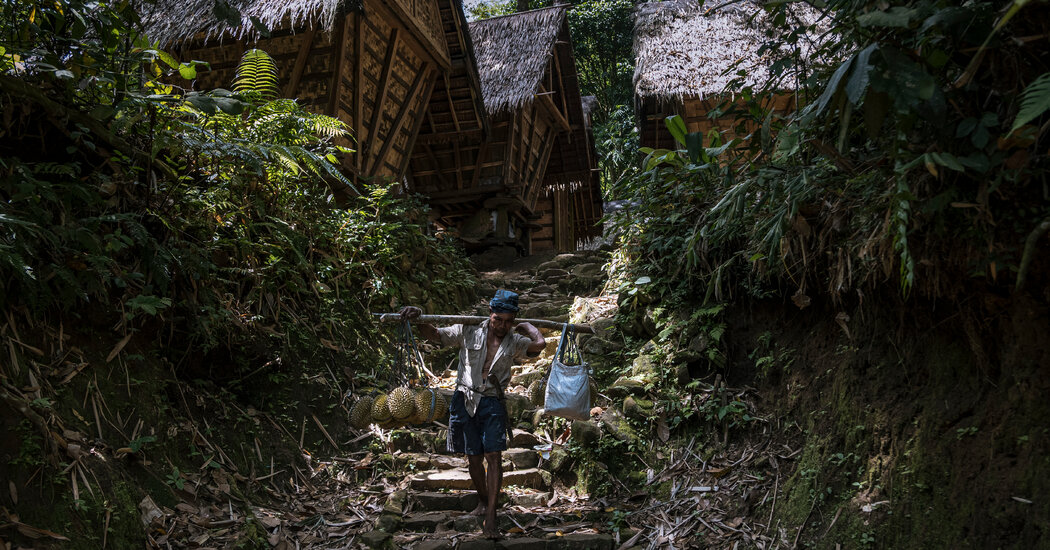
KANEKES, Indonesia — When their ancestors warned them, through dreams and a bone-bitingly cold wind, to be careful, the community leaders of the Baduy people in Indonesia knew they needed to protect their villages from something bad that was on its way.
So Jaro Nalim, one of the senior leaders in the Baduy hamlet of Cikertawana on the island of Java, began performing the rites meant to keep disease at bay, including placing bamboo containers filled with blessed water at the four directions of the village’s borders so no sickness could enter.
“We performed ceremony, traditional rituals, asking God and our ancestors to protect us from the disease,” Mr. Nalim said. “We believe we are protected.”
Government signs promoting health protocols could be seen around the village: Wash your hands, wear a mask, do not gather in groups. But on a recent visit, there were no masks in sight among the villagers, who knew about the coronavirus but didn’t seem worried about it.
“We are already protected with mantras,” said Jawi, 19, on the terrace outside her home where her toddler slept inside. “The air here is fresh and clean. Why wear a mask and breathe in the dirty air from our breath?”
As Indonesia’s government seeks to control the spread of the coronavirus across a vast archipelago, home to some 275 million people with multiple belief systems, inducing people to wear masks is but one challenge. Perhaps an even bigger one, especially in Indigenous communities like the Baduy, is vaccinations.
About 70 million Indonesians are considered Indigenous people, who often live in remote locations that greatly complicate vaccination efforts, with some villages accessible only after hourslong marches. The government has also struggled to communicate to Indigenous groups what vaccines are and why they’re important, according to Annas Radin Syarif, head of the emergency response division at the Indigenous Peoples’ Alliance of the Archipelago, a rights organization in Indonesia.
And a few Indigenous groups adhere to deep-rooted traditions that can run counter to modern health policy.
As a general principle, the Baduy reject vaccinations, although some have reluctantly accepted them in order to travel outside the area.
“For Baduy people, vaccine is a violation,” Mr. Nalim said. “It ruins our purity. Why put chemicals into our body when all cures have been provided by nature? Our ancestors taught us mantra to cure and prevent diseases.”
Indonesia’s health minister, Budi Gunadi Sadikin, while conceding it was a “difficult” task, said the government was determined to vaccinate as many people as it could. “Yes, there are traditional beliefs, and for this we need a special approach,” he said in an interview. “We want them to be protected, too.”
The Baduy live in the hinterlands of Banten, the westernmost province on Java, where they practice Sunda Wiwitan, a religion whose followers are monotheistic, but who at the same time revere the power of nature and the spirits of ancestors.
All Baduy are taught to abide by the principle that the natural world is not to be harmed. While most make their living as farmers, much of the forest that surrounds them is considered sacred, and off-limits to tilling.
There are around 13,300 Baduy people, living in 68 hamlets on the slope of Mount Kendeng, and they divide themselves into two groups: the Baduy Luar, who interact with outsiders and use some modern conveniences; and the Baduy Dalam, who are totally cut off from technology and the outside world.
The 1,200 or so Baduy Dalam live in three hamlets where electricity, electronics, pesticide (and foreigners) are prohibited, though their secluded villages are only a four-hour drive from Jakarta, Indonesia’s capital of 11 million people.
Also on the long list of taboo objects for the Dalam: soap, shoes, pants and nails.
For both Baduy groups, four-legged animals, other than dogs and cats, are prohibited within the villages’ borders.
The easiest way to tell the two groups apart: The Baduy Dalam men wear white turbans while the Baduy Luar men wear batik ones.
Over the past decade, the Baduy Luar have welcomed tourists, who come for the area’s natural beauty and cultural richness. The Baduy Luar have also welcomed some changes.
Women weave with earphones plugged in. Children stare at their mobile phones, which are charged on the small battery at the village office. Store-bought drugs now compete with natural remedies and with their mantras.
Nevertheless, the Baduy Luar villagers still deeply respect their traditions. Children playing could be spotted all around. They are prohibited from attending formal schools.
There is no electricity, and no TVs or radios, and houses are veiled in darkness after sunset. Cooking is done over firewood stoves. Families gather to eat dinner under flickering kerosene lanterns.
“We still maintain our customs. If we mock our customary laws, or break the customary law, we are afraid of karma. There will always be punishments,” said Jaro Saija, the chief of Kanekes, as the collection of Baduy hamlets are known.
Opting not to be vaccinated, said Mr. Budi, the health minister, is a human right. “We have to be patient. We should never force them,” he said. “It has to be the right method, with the right communication, and the right person,” he added, referring to influencers in Indigenous communities who could help persuade people.
Despite their stance on vaccinations, the Baduy, who live in one of the provinces hardest hit by Covid, appear to have successfully avoided the worst of the pandemic.
There have been no deaths attributed to Covid in the Baduy area. Through the first year and a half of the pandemic, up to June 2021, there were zero Covid cases reported. The first was recorded in July last year, and there have been a total of eight known cases through mid-June, according to Iton Rustandi, a local health official.
Both health officials and the Baduy themselves believe it’s their way of living and remoteness from congested, urban life that has spared them. Outside visitors are few. The concept of social distancing is incorporated into their beliefs, with their airy homes widely spaced and physical contact limited. They don’t shake hands. Many villagers walk to farm their fields, which are entirely organic.
“The Baduy take care of their immunity by ensuring they guard the pureness of their relations with God, nature and their ancestors,” said Uday Suhada, a sociologist who has long studied the Baduy. “Whether you believe it or not. It might not seem logical, but that’s the fact.”
Isolated as the Baduy are, parts of their economy are tied to the outside world, and some villagers travel by rail to provincial towns to sell their crafts and farm produce.
The Indonesian government, however, requires that all train passengers show a vaccine certificate, and so some Baduy Luar get special dispensation to be vaccinated. As long as it’s being done for the community’s greater good, the body that oversees Baduy customs gives people the freedom to choose.
By the end of May, 299 Badui Luar had received a first dose and 66 a second.
The Baduy “are very flexible and considerate,” Mr. Uday said. “Yes, there is local wisdom, inherited over the centuries, that they uphold. But if something is needed, well-communicated and for the greater good, the senior leaders will allow them to do so.”
Mr. Saija, the village chief, travels to meet government officials, and he was the first among the Baduy Luar community members to receive a vaccination. (With perhaps one unconfirmed exception, no Baduy Dalam have been vaccinated.) He stressed that, at least at first, he and others had agreed to be vaccinated only so they could move freely about.
“The only reason why some of Baduy people are willing to be vaccinated is so that they can travel,” Mr. Saija said. “We believe that through our prayers and mantras, we are already protected.”
And, he said, villagers who do get vaccinated are obligated to perform purification rituals that included prayer and fasting. “It is important for us to do our traditional rituals to get our pureness back,” Mr. Saija said. “To have our mantras sharp again.”
Still, after some consideration, he conceded there might be some merit to this mixing of the modern with his ancient faith.
“For me, the most important thing is to protect my community and stay healthy,” he said. “Therefore, I am doing everything: the medical thing and the mantras thing.”




